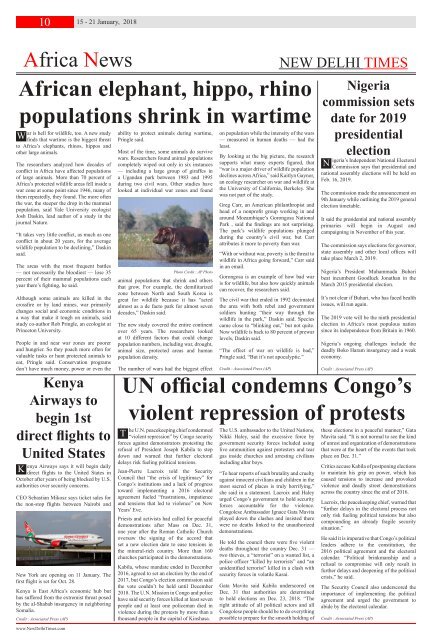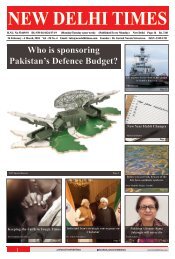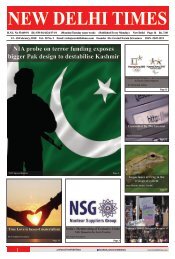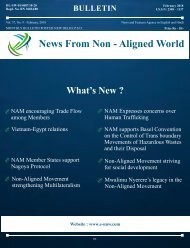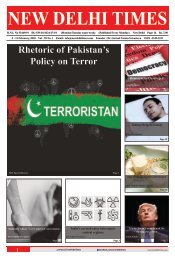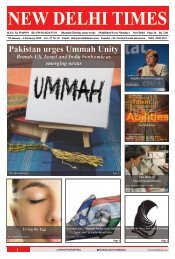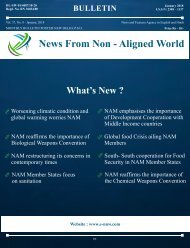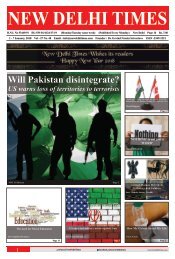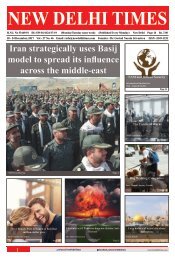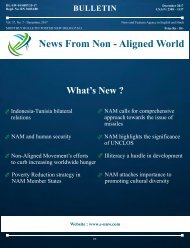15-21 January 2018 - 16-min
Create successful ePaper yourself
Turn your PDF publications into a flip-book with our unique Google optimized e-Paper software.
10<br />
<strong>15</strong> - <strong>21</strong> <strong>January</strong>, <strong>2018</strong><br />
Africa News<br />
African elephant, hippo, rhino<br />
populations shrink in wartime<br />
ar is hell for wildlife, too. A new study<br />
W<br />
finds that wartime is the biggest threat<br />
to Africa’s elephants, rhinos, hippos and<br />
other large animals.<br />
The researchers analyzed how decades of<br />
conflict in Africa have affected populations<br />
of large animals. More than 70 percent of<br />
Africa’s protected wildlife areas fell inside a<br />
war zone at some point since 1946, many of<br />
them repeatedly, they found. The more often<br />
the war, the steeper the drop in the mammal<br />
population, said Yale University ecologist<br />
Josh Daskin, lead author of a study in the<br />
journal Nature.<br />
“It takes very little conflict, as much as one<br />
conflict in about 20 years, for the average<br />
wildlife population to be declining,” Daskin<br />
said.<br />
The areas with the most frequent battles<br />
— not necessarily the bloodiest — lose 35<br />
percent of their mammal populations each<br />
year there’s fighting, he said.<br />
Although some animals are killed in the<br />
crossfire or by land <strong>min</strong>es, war primarily<br />
changes social and economic conditions in<br />
a way that make it tough on animals, said<br />
study co-author Rob Pringle, an ecologist at<br />
Princeton University.<br />
People in and near war zones are poorer<br />
and hungrier. So they poach more often for<br />
valuable tusks or hunt protected animals to<br />
eat, Pringle said. Conservation programs<br />
don’t have much money, power or even the<br />
Kenya<br />
Airways to<br />
begin 1st<br />
direct flights to<br />
United States<br />
K<br />
enya Airways says it will begin daily<br />
direct flights to the United States in<br />
October after years of being blocked by U.S.<br />
authorities over security concerns.<br />
CEO Sebastian Mikosz says ticket sales for<br />
the non-stop flights between Nairobi and<br />
New York are opening on 11 <strong>January</strong>. The<br />
first flight is set for Oct. 28.<br />
Kenya is East Africa’s economic hub but<br />
has suffered from the extremist threat posed<br />
by the al-Shabab insurgency in neighboring<br />
Somalia.<br />
Credit : Associated Press (AP)<br />
www.NewDelhiTimes.com<br />
ability to protect animals during wartime,<br />
Pringle said.<br />
Most of the time, some animals do survive<br />
wars. Researchers found animal populations<br />
completely wiped out only in six instances<br />
— including a large group of giraffes in<br />
a Ugandan park between 1983 and 1995<br />
during two civil wars. Other studies have<br />
looked at individual war zones and found<br />
Photo Credit : AP Photo<br />
animal populations that shrink and others<br />
that grow. For example, the demilitarized<br />
zone between North and South Korea is<br />
great for wildlife because it has “acted<br />
almost as a de facto park for almost seven<br />
decades,” Daskin said.<br />
The new study covered the entire continent<br />
over 65 years. The researchers looked<br />
at 10 different factors that could change<br />
population numbers, including war, drought,<br />
animal size, protected areas and human<br />
population density.<br />
on population while the intensity of the wars<br />
— measured in human deaths — had the<br />
least.<br />
By looking at the big picture, the research<br />
supports what many experts figured, that<br />
“war is a major driver of wildlife population<br />
declines across Africa,” said Kaitlyn Gaynor,<br />
an ecology researcher on war and wildlife at<br />
the University of California, Berkeley. She<br />
was not part of the study.<br />
Greg Carr, an American philanthropist and<br />
head of a nonprofit group working in and<br />
around Mozambique’s Gorongosa National<br />
Park , said the findings are not surprising.<br />
The park’s wildlife populations plunged<br />
during the country’s civil war, but Carr<br />
attributes it more to poverty than war.<br />
“With or without war, poverty is the threat to<br />
wildlife in Africa going forward,” Carr said<br />
in an email.<br />
Gorongosa is an example of how bad war<br />
is for wildlife, but also how quickly animals<br />
can recover, the researchers said.<br />
The civil war that ended in 1992 decimated<br />
the area with both rebel and government<br />
soldiers hunting “their way through the<br />
wildlife in the park,” Daskin said. Species<br />
came close to “blinking out,” but not quite.<br />
Now wildlife is back to 80 percent of prewar<br />
levels, Daskin said.<br />
“The effect of war on wildlife is bad,”<br />
Pringle said. “But it’s not apocalyptic.”<br />
NEW DELHI TIMES<br />
The number of wars had the biggest effect Credit : Associated Press (AP)<br />
Credit : Associated Press (AP)<br />
UN official condemns Congo’s<br />
T<br />
violent repression of protests<br />
he U.N. peacekeeping chief condemned<br />
“violent repression” by Congo security<br />
forces against demonstrators protesting the<br />
refusal of President Joseph Kabila to step<br />
down and warned that further electoral<br />
delays risk fueling political tensions.<br />
Jean-Pierre Lacroix told the Security<br />
Council that “the crisis of legitimacy” for<br />
Congo’s institutions and a lack of progress<br />
toward implementing a 20<strong>16</strong> electoral<br />
agreement fueled “frustrations, impatience<br />
and tensions that led to violence” on New<br />
Years’ Eve.<br />
Priests and activists had called for peaceful<br />
demonstrations after Mass on Dec. 31,<br />
one year after the Roman Catholic Church<br />
oversaw the signing of the accord that<br />
set a new election date to ease tensions in<br />
the <strong>min</strong>eral-rich country. More than <strong>16</strong>0<br />
churches participated in the demonstrations.<br />
Kabila, whose mandate ended in December<br />
20<strong>16</strong>, agreed to set an election by the end of<br />
2017, but Congo’s election commission said<br />
the vote couldn’t be held until December<br />
<strong>2018</strong>. The U.N. Mission in Congo and police<br />
have said security forces killed at least seven<br />
people and at least one policeman died in<br />
violence during the protests by more than a<br />
thousand people in the capital of Kinshasa.<br />
The U.S. ambassador to the United Nations,<br />
Nikki Haley, said the excessive force by<br />
government security forces included using<br />
live ammunition against protesters and tear<br />
gas inside churches and arresting civilians<br />
including altar boys.<br />
“To hear reports of such brutality and cruelty<br />
against innocent civilians and children in the<br />
most sacred of places is truly horrifying,”<br />
she said in a statement. Lacroix and Haley<br />
urged Congo’s government to hold security<br />
forces accountable for the violence.<br />
Congolese Ambassador Ignace Gata Mavita<br />
played down the clashes and insisted there<br />
were no deaths linked to the unauthorized<br />
demonstrations.<br />
He told the council there were five violent<br />
deaths throughout the country Dec. 31 —<br />
two thieves, a “terrorist” on a wanted list, a<br />
police officer “killed by terrorists” and “an<br />
unidentified terrorist” killed in a clash with<br />
security forces in volatile Kasai.<br />
Gata Mavita said Kabila underscored on<br />
Dec. 31 that authorities are deter<strong>min</strong>ed<br />
to hold elections on Dec. 23, <strong>2018</strong>. “The<br />
right attitude of all political actors and all<br />
Congolese people should be to do everything<br />
possible to prepare for the smooth holding of<br />
Nigeria<br />
commission sets<br />
date for 2019<br />
presidential<br />
N<br />
election<br />
igeria’s Independent National Electoral<br />
Commission says that presidential and<br />
national assembly elections will be held on<br />
Feb. <strong>16</strong>, 2019.<br />
The commission made the announcement on<br />
9th <strong>January</strong> while outlining the 2019 general<br />
election timetable.<br />
It said the presidential and national assembly<br />
primaries will begin in August and<br />
campaigning in November of this year.<br />
The commission says elections for governor,<br />
state assembly and other local offices will<br />
take place March 2, 2019.<br />
Nigeria’s President Muhammadu Buhari<br />
beat incumbent Goodluck Jonathan in the<br />
March 20<strong>15</strong> presidential election.<br />
It’s not clear if Buhari, who has faced health<br />
issues, will run again.<br />
The 2019 vote will be the ninth presidential<br />
election in Africa’s most populous nation<br />
since its independence from Britain in 1960.<br />
Nigeria’s ongoing challenges include the<br />
deadly Boko Haram insurgency and a weak<br />
economy.<br />
these elections in a peaceful manner,” Gata<br />
Mavita said. “It is not normal to see the kind<br />
of unrest and organization of demonstrations<br />
that were at the heart of the events that took<br />
place on Dec. 31.”<br />
Critics accuse Kabila of postponing elections<br />
to maintain his grip on power, which has<br />
caused tensions to increase and provoked<br />
violence and deadly street demonstrations<br />
across the country since the end of 20<strong>16</strong>.<br />
Lacroix, the peacekeeping chief, warned that<br />
“further delays in the electoral process not<br />
only risk fueling political tensions but also<br />
compounding an already fragile security<br />
situation.”<br />
He said it is imperative that Congo’s political<br />
leaders adhere to the constitution, the<br />
20<strong>16</strong> political agreement and the electoral<br />
calendar. “Political brinkmanship and a<br />
refusal to compromise will only result in<br />
further delays and deepening of the political<br />
crisis,” he said.<br />
The Security Council also underscored the<br />
importance of implementing the political<br />
agreement and urged the government to<br />
abide by the electoral calendar.<br />
Credit : Associated Press (AP)


